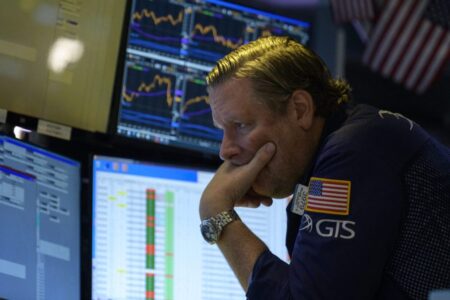With the economy showing relative strength in 2023, even in the face of aggressive interest rate hikes, many previously bearish economists and Wall Street titans have flip-flopped on their predictions for a recession. The Federal Reserve may be able to tame inflation without sparking a job-killing recession after all, they now argue—after warning of impending economic doom for over two years. But Oren Klachkin, lead U.S. economist at the independent economics advisory firm Oxford Economics, doesn’t buy the new rosy outlook.
“Some forecasters are removing a U.S. recession from their baselines. But we continue to think that elevated interest rates, restrictive Fed policy, and tight lending standards will cause a mild recession in late 2023,” he wrote in a Tuesday note.
Klachkin acknowledged some risks to his forecast, noting that the economy has impressively recovered from the pandemic. But with consumers quickly spending their COVID-era savings and businesses slowing hiring, the economist still believes a “mild recession” is coming.
However, Klachkin also noted that how you define a recession is important in this case. The National Bureau of Economic Research (NBER) defines a recession as two consecutive quarters of negative gross domestic product (GDP) growth coupled with “a significant decline in economic activity that is spread across the economy and lasts more than a few months.”
But “with some industries performing poorly and others remaining buoyant, it’s possible that the economic data won’t satisfy the traditional definition of recession used by the National Bureau of Economic Research – the arbiter of U.S. recessions,” Klachkin explained.
After years of COVID lockdowns and travel restrictions, Americans are back at airports and restaurants, looking to make up for lost time. Their rapid shift in spending habits has helped services sectors, like travel and leisure, thrive even as sectors that focus on selling goods, like manufacturing and construction, struggle.
If that continues: “Instead of a typical recession, it’s possible the economy will fall into – or in fact is already in – a ‘rolling’ recession,” Klachkin wrote.
A rolling recession is when some industries contract and suffer job losses, while others continue to grow, leaving the overall GDP growth positive, but low by historical standards.
Klachkin isn’t the only forecaster arguing a rolling recession is here. Ed Yardeni, founder of Yardeni Research, has argued for months that interest rate sensitive sectors, from housing to manufacturing, are already in a rolling recession, while other, less rate sensitive sectors, from healthcare to education, have managed to continue growing.
However, some more bullish economists, including Moody’s Mark Zandi, are betting on a soft landing. Zandi said earlier this summer that light household debt loads, stable oil prices, and anchored inflation expectations should help the Fed tame inflation without a subsequent rise in unemployment.
Still, Klachkin pointed to Oxford Economics’ newly-developed industry ‘Business Cycle Indicators’ model—which measures the expansion or contraction of individual sectors—to bolster the evidence that the rolling recession is underway.
The services sector is in a “robust trend,” according to the model, due to strong leisure and hospitality spending, income growth, and growing business investment. However, when it comes to the goods producing sectors, including manufacturing and construction, it’s a different story.
Oxford Economics
“Our BCIs for the goods-producing industries are suffering,” Klachkin wrote. “With goods demand far below its pandemic-related peak, companies prudently managing their inventories, interest rates at multiyear highs, and credit flowing less freely to businesses and consumers, it isn’t surprising that our manufacturing BCI is offering a gloomy signal.”
For the manufacturing, construction and other goods producing sectors, a downturn is already here, according to Oxford Economics. And if a true recession does hit the entire economy as the Fed hikes interest rates: “History shows that goods-producing industries typically suffer greater losses of output and jobs,” Klachkin warned.
